- Home
- Deborah Harkness
Time's Convert Page 10
Time's Convert Read online
Page 10
“Whoever would have imagined that little more than a month after Gallowglass wrote this letter, a shot fired on a bridge in a small town outside Boston would become Emerson’s ‘shot heard around the world,’” Marcus mused. “The day we decided that King George had mistreated us long enough started out just like any other April day. I was coming home from Northampton. It had been a warm spring, and the ground was soft. On that day, though, the winds from the east blew cold.”
Marcus’s eyes were unfocused, his tone almost dreamy as he remembered that long-ago time.
“And with them came a rider.”
Les Revenants, Letters and Papers of the Americas
No. 1
Gallowglass to Philippe de Clermont
Cambridge, Massachusetts
6 March 1775
Grandsire:
I was at the Old South Meeting House this morning when Dr. Warren spoke on the fifth anniversary of the late massacre in Boston. The crowds were very large, and the doctor draped himself in a white toga, following the Roman style. The Sons of Liberty greeted this spectacle with cheers.
Dr. Warren stirred the assembly with mention of his bleeding country and calls to stand up to a tyrant’s power. To avoid war, Warren said, the British army must withdraw from Boston.
It will take only a spark to set rebellion alight. “Short-sighted mortals see not the numerous links of small and great events, which form the chain on which the fate of kings and nations is suspended,” Dr. Warren said. I wrote it down in the moment, for it struck me as wise.
I have placed this letter in the hands of Davy Hancock, who will see it safe delivered by the swiftest route. I have returned to Cambridge on your other business. I await your wishes with respect to the Sons of Liberty, but predict that your response will not arrive in time for me to alter what now seems inevitable: The oak and the ivy will not grow stronger together, but will be torn asunder.
Written in haste from the town of Cambridge by your dutiful servant,
Eric
Postscript: I enclose a curious item that was given to me as a memento by one of the Sons of Liberty. He said it was the remains of a musket ball fired by the British into a house on King Street when the citizens were attacked in 1770. There were many tales of that dreadful day shared by those in attendance at Dr. Warren’s oration, which further inflamed the passions of those who desire liberty.
9
Crown
APRIL–JUNE 1775
Marcus juggled the pail of fish between his hands and pushed open the door to Thomas Buckland’s Northampton surgery. Buckland was one of the few medical men west of Worcester, and though he was neither the most prosperous nor the best educated, he was by far the safest choice if you wanted to survive a visit to the doctor. The metal bell that hung over the door tinkled brightly, announcing Marcus’s arrival.
The surgeon’s wife was working in the front room, where Buckland’s equipment—forceps, teeth-pullers, and cauterization irons—lay in a gleaming row on a clean towel. Pots of herbs, medicines, and salves were displayed on the shelves. The surgery’s windows overlooked Northampton’s main street so that interested passersby could witness the pain and suffering going on inside as Buckland set bones, peered into mouths and ears, drew teeth, and examined aching limbs.
“Marcus MacNeil. What are you doing here?” Mercy Buckland looked up from the table where she was putting ointment into a stone crock.
“I was hoping to trade some fish for a bit of that tisane you gave my mother last month.” Marcus held up his pail. “Shad. Freshly caught at the falls south of Hadley.”
“Does your father know where you are?” Mrs. Buckland had witnessed the argument that broke out a few months ago when Obadiah caught him talking with Tom about how to make a salve to heal bruises. After that, his father had forbidden him from going to Northampton for cures. Obadiah insisted that the family see the nearsighted doctor in Hadley instead, who was half as good and twice as expensive, but whose age and tendency to overindulge in spirits made him less likely to interfere in MacNeil family business.
“There’s no point in asking, Mercy. Marcus won’t answer. He’s become a man of few words.” Tom Buckland joined his wife, his balding head shining in the spring light. “For myself, I miss the boy who couldn’t stop talking.”
Marcus felt Mrs. Buckland’s eyes on him as she studied his thin arms, the piece of rope that cinched his breeches to his narrow waist, the hole in the toe of his left shoe, the patches on his blue-and-white-checked shirt made from coarse cloth his sister Patience had woven from the flax grown on their farm.
But he didn’t want the Bucklands’ pity. He didn’t want anything—except some tisane. Marcus’s mother was able to sleep after she had some of Mrs. Buckland’s famous concoction. The surgeon’s wife had taught him what was in it—valerian and hops and skullcap—but these plants weren’t grown in the MacNeil family garden.
“Is there news from Boston?” Marcus asked, trying to change the subject.
“The Sons of Liberty are rallying against the Redcoats,” Tom replied, peering through his spectacles at the shelves in search of the right herbal mixture. “Everyone is fired up, thanks to Dr. Warren. Someone passing through from Springfield said more trouble is expected—though God hopes it won’t be another massacre.”
“I heard the same, down at the falls,” Marcus replied. It was how news traveled through to small towns like these—one piece of gossip at a time.
Tom Buckland pressed a packet into his hand. “For your mother.”
“Thank you, Dr. Buckland,” Marcus said, putting his pail on the counter. “These are for you. They’ll make a fine dinner.”
“No, Marcus. That’s too much,” Mercy protested. “Half of that bucket is more than enough for Thomas and me. You should take the rest home. I’ve moved the buttons on Thomas’s breeches twice this winter.”
Marcus shook his head, refusing the offer. “Thank you, Dr. Buckland. Mrs. Buckland. You keep it. I’ve got to get home.”
Tom tossed him a small crock. “Salve. For the extra fish. We like to keep our accounts current. You could put some of it on your eye.”
Tom had noticed the blackening on Marcus’s cheekbone. He thought it was faded enough to risk a trip into Northampton without setting any tongues wagging. But Tom was sharp-eyed and didn’t miss much.
“I stepped on a hay rake, and the handle hit me square in the face. You know how clumsy I am, Dr. Buckland.” Marcus opened the shop door and tipped his moth-eaten hat at the couple. “Thank you for the tisane.”
* * *
—
MARCUS BORROWED A RICKETY RAFT to cross the river rather than take the ferry, and was on the puddled road back home when he narrowly avoided being struck down by a rider on a fast horse headed toward the center of Hadley.
“What’s happened?” Marcus snatched at the horse’s reins in a vain attempt to hold the animal still.
“Our militia engaged the regulars at Lexington. Blood has been shed,” the rider cried out, his lungs heaving with effort. He turned the horse’s head, ripping the reins from Marcus’s grasp, and shot off in the direction of the meetinghouse.
Marcus ran the rest of the way back to the MacNeil farm. He would need food and a gun if he was going to join the militia on the march east. He slid through the damp grass in front of the garden gate, narrowly avoiding a furious goose that snapped at his breeches as he passed.
“Bloody goose,” Marcus said under his breath. If not for the eggs, he would have wrung the creature’s neck long ago.
He slipped through the front door with its faded red paint. Old Widow Noble said the split in the door’s upper panel was a relic of an Indian raid that had taken place in the last century—but the old woman believed in witches, ghosts, and headless horsemen, too. Inside the house was quiet, the only sound the regular ticking of his mother’s old cl
ock on the mantel in the parlor.
“I heard the bell.” Catherine MacNeil rushed out from the kitchen, the only other room on the ground floor of the house, drying her hands on a worn towel. His mother was pale, and her eyes were dark-rimmed from lack of sleep. The farm wasn’t thriving, his father was always off drinking with his friends, and the winter had been hard and long.
“The army attacked in Lexington,” Marcus replied. “They’re calling out the militia.”
“Boston? Is it safe?” As far as Catherine was concerned, the city of her childhood was the center of the world, and everything that was great or good came from there.
At the moment, Marcus was less concerned with the threat Boston faced than with the one that shared their hearth and home.
“Where’s Pa?” Marcus asked.
“Amherst. He went to see Cousin Josiah.” His mother’s lips tightened. “Your father won’t be back anytime soon.”
Sometimes Obadiah was gone for days and returned with torn clothes and bruises, his knuckles bleeding and his breath smelling of rum. If Marcus was lucky, he could go to Lexington and be back again before his father sobered up and noticed his son was missing.
Marcus went into the parlor and took the old blunderbuss from the hooks over the fireplace.
“Your grandfather MacNeil owned that gun,” his mother said. “He had it when he arrived from Ireland.”
“I remember.” Marcus ran his fingers over the old wooden stock. Grandfather MacNeil had told him stories about his adventures with the gun: the first time he felled a deer when the family didn’t have enough to eat, how he’d carried it when they went out to hunt wolves when Pelham and Amherst were just tiny settlements.
“What will I tell your father when he comes back?” His mother looked stricken. “You know he’s worried about what might happen if there’s another war.”
Obadiah had fought in the last war against the French. He had been the flower of the local militia once, brave and strong. Marcus’s father and mother had been newly married, and Obadiah had big plans for improving the farm he had purchased, or so Catherine remembered. But Obadiah had returned from the campaigns weak in body and broken in spirit, caught between conflicting loyalties to kin and king.
On the one hand, Obadiah believed wholeheartedly in the sanctity of the British monarchy and the king’s love for his subjects. Yet Obadiah had witnessed atrocities on the frontier that made him question whether Britain had her colonies’ best interests at heart. Like most of the militia who fought in the war, Obadiah found little to admire about the British army. He believed the officers had knowingly put him in harm’s way with their blind obedience to orders that arrived from London weeks—if not months—too late to be of any use.
Between his divided loyalties, the violent nightmares of war that plagued him, and his taste for strong drink, Obadiah could not decide whether their present fight with the king was legitimate or not. The puzzle was slowly driving him mad.
“Tell him you haven’t seen me—that you came in from the henhouse and found the gun was gone.” Marcus didn’t want his mother or his sister to pay the price for his disobedience.
“Your father isn’t a fool, Marcus,” his mother said. “He’ll have heard the bells.”
They were still pealing—in Hadley, in Northampton, in every meetinghouse in Massachusetts, probably.
“I’ll be home before you know it,” Marcus assured his mother. He kissed her on the cheek, shouldered his gun, and headed into town.
He met up with Joshua Boston and Zeb Pruitt outside the town’s burial ground, where Zeb was at work digging a grave. It was ringed with tall trees, and the burial stones popped out from the ground at all angles, moss covered and worn from the weather.
“Hey, Marcus,” Joshua called out. “You joining in the fight?”
“I thought I might,” Marcus replied. “It’s time King George stopped treating us like children. Freedom is our birthright as British subjects. Nobody should be able to take it from us, and we shouldn’t have to fight for it.”
“Or die for it,” Zeb muttered.
Marcus frowned. “Don’t you mean kill for it?”
“I said what I meant” was Zeb’s quick answer. “If a man drinks enough rum, or someone stirs up enough fear and hate in his heart, he’ll kill quick enough. But that same man will run from the battlefield the first chance he gets if he doesn’t believe what he’s fighting for, body and soul.”
“Best think hard about whether you have that kind of patriotism, Marcus—before you go marching off to Lexington with the militia,” Joshua said.
“Too late.” Zeb squinted into the distance. “Here comes Mr. MacNeil, and Josiah with him.”
“Marcus?” Obadiah stopped in the middle of the street, peering at him through bloodshot eyes. “Where are you going with my gun, boy?”
It wasn’t Obadiah’s gun, but Marcus felt sure this wasn’t the time to argue the point.
“I asked you a question.” Obadiah advanced on them, his steps irregular but still menacing.
“Town. They’ve called up the militia.” Marcus stood his ground.
“You’re not going to war against your king,” Obadiah said, grabbing at the gun. “It’s against God’s holy order to defy him. Besides, you’re just a child.”
“I’m eighteen.” Marcus refused to let go.
“Not yet you’re not.” Obadiah’s eyes narrowed and his mouth tightened.
This was usually the moment when Marcus capitulated, eager to keep the peace so that his mother didn’t intervene and get caught between her husband and her son.
But today, with Zeb’s and Joshua’s words ringing in his ears, Marcus felt that he had something to prove—to himself, to his father, and to his friends. Marcus stood taller, ready for a fight.
His father delivered a stinging slap across one cheek and then the other. It was not the blow you would give a man, but a woman or a child. Even in his anger, Obadiah was determined to remind Marcus of his place.
Obadiah wrested the gun from Marcus’s hands.
“Go back home to your ma,” Obadiah said contemptuously. “I’ll see you there. First, I need to have a word with Zeb and Joshua.”
His father would beat him when he got back to the farm. From the expression in Obadiah’s eye, Zeb and Joshua might receive a thrashing as well.
“They’ve got nothing to do with it,” Marcus said, his cheeks red from his father’s blows.
“Enough disobedience, boy,” Obadiah barked.
Joshua jerked his head in the direction of the farm. It was a silent request for Marcus to leave before things got even more heated.
He turned his back on his friends, on the war, and on his father and moved down the road toward the MacNeil farm.
Marcus promised himself it was the last time his father would tell him what to do.
* * *
—
IN JUNE, Marcus kept his word by running away to Boston. He had been beaten, several times, since the Lexington alarm. The violence usually began after Marcus questioned his father about something small and innocuous—whether the cows needed to be milked, or if the well was running dry. Obadiah took his questions as further signs of rebellion.
Each blow that his father gave with the folded leather reins seemed to make him calmer, his eyes growing less frantic and his speech less angry. Marcus had learned long ago not to cry while his father beat him, not even when his legs were covered with excruciating welts. Tears only made his father more desperate to exorcise Marcus’s demons. Usually Obadiah kept going until Marcus collapsed with pain. Then Obadiah took to the taverns, moving from one to the other until he collapsed, too, in a drunken heap.
It was after one of those beatings, while Obadiah was still out drowning his sorrows, that Marcus had packed a pail of food and the family almanac that outlined the towns on
the Boston road so that he could mark his progress, and started walking east.
By the time Marcus reached Cambridge, Harvard Yard was buzzing like a hornet’s nest. The college had been emptied of its students, and militia from all over New England now occupied their rooms. When the college halls were filled up, the soldiers erected tents outside without much concern for their relationship to one another, the cobblestone streets, the lampposts, or the flow of sewage. The result was a makeshift encampment, crazed with narrow footpaths like the cracks in old crockery that wended their way between the flapping sheets of canvas, linen, and burlap.
Marcus entered the tent city and what had been a steady hum of activity became a din that rivaled the pounding of British artillery. Regimental musicians roused the inexperienced soldiers for the coming battle with a steady beating of their drums. Dogs, horses, and the occasional mule barked, neighed, and brayed. Men freshly arrived from towns as far away as New Haven to the south and Portsmouth to the north discharged their weapons at the slightest provocation, sometimes deliberately and more often accidentally.
Marcus was following the scent of burned coffee and roasted meat in search of something to eat when a familiar face turned toward him.
“Damn.” Marcus had been spotted by someone from back home.
Seth Pomeroy’s shrewd eyes settled on him, dark and deeply set over prominent cheekbones divided by a sharp nose. The Northampton gunsmith’s forbidding expression proclaimed that this was not a man to meddle with.
“MacNeil. Where’s your gun?” Pomeroy’s breath was foul—there was a decayed tooth in the front of his mouth that wiggled when he was angry. Tom Buckland wanted to pull it, but Pomeroy was adamantly opposed to dentistry, so the tooth was destined to rot in place.
“My pa has it,” Marcus replied.
Pomeroy thrust a musket at Marcus, one of his own and much finer than Grandfather MacNeil’s old blunderbuss.
“And does your father know you’re here?” Pomeroy asked. Like Mrs. Buckland, Pomeroy knew that Obadiah ruled his family with an iron fist. Nobody did anything without his permission—not if he valued his own hide.

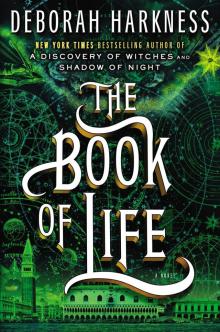 The Book of Life
The Book of Life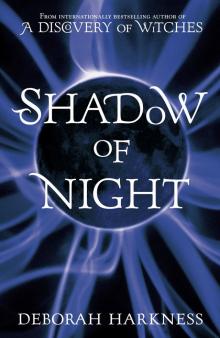 Shadow of Night
Shadow of Night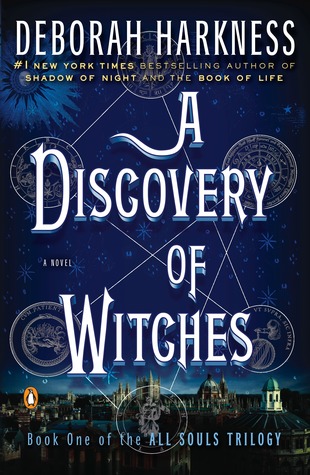 A Discovery of Witches
A Discovery of Witches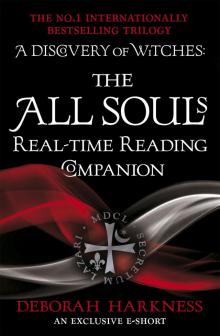 The All Souls Real-Time Reading Companion
The All Souls Real-Time Reading Companion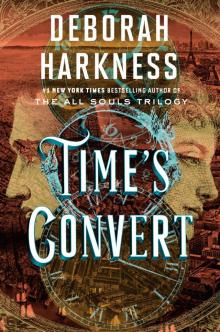 Time's Convert
Time's Convert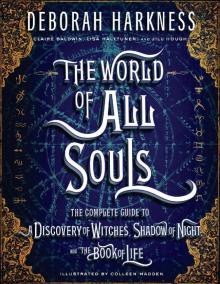 The World of All Souls
The World of All Souls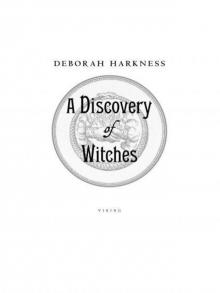 A Discovery of Witches: A Novel (All Souls Trilogy)
A Discovery of Witches: A Novel (All Souls Trilogy)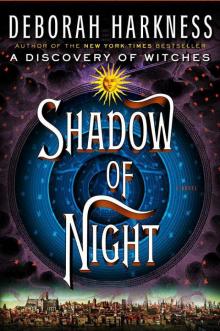 Shadow of Night: A Novel
Shadow of Night: A Novel